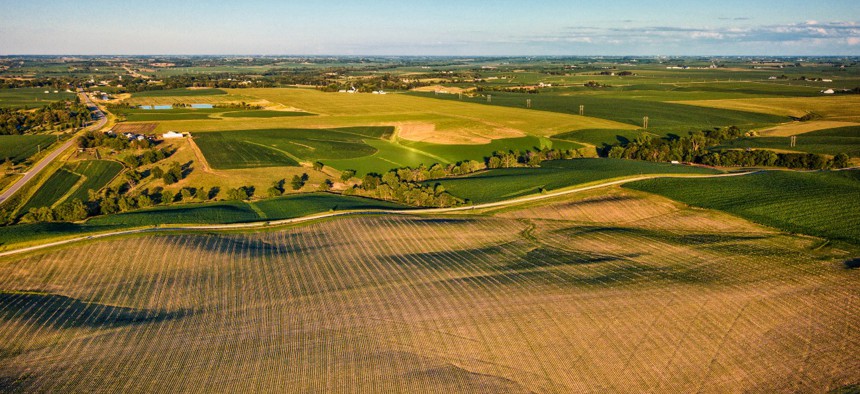
Monte Goodyk / Getty Images
Biden is Deploying Feds to Rural Areas to Better Connect Communities With Government
The new hires will help local leaders in distressed areas navigate the bureaucracy to access federal staff and resources.
The Biden administration announced on Wednesday it will deploy federal workers to various locations around the country to boost the partnership between rural communities and federal agencies, saying more direct relationships will help those areas gain access to more resources.
The Rural Partners Network will send dozens of new federal employees to serve as “community liaisons” in economically distressed rural areas, who will in turn report to designated points of contact at 16 agencies to discuss shortcomings and solutions. While several agencies already have components dedicated to rural outreach, the Biden administration called the direct engagement to facilitate partnerships across government a “first of its kind” initiative.
The program will start in 25 rural communities across five states and additional Tribal areas, with plans to include five more states and Puerto Rico as part of its second phase. The administration said it is focusing on the most economically distressed areas, but hopes to eventually have a Rural Partners Network presence in all 50 states.
A bipartisan chorus of lawmakers has in recent years called for a program like this, and the administration said the need for it became clearer during the pandemic as certain communities struggled to access federal resources. As agencies look to disburse billions of dollars made available in the recent infrastructure law and remaining funds from COVID-19 relief, the new program will help ensure equitable access for rural areas, White House Domestic Policy Advisor Susan Rice said.
Agriculture Department Secretary Tom Vilsack said rural communities will benefit from more direct and specific relationships with federal employees.
“The Rural Partners Network will help communities get funding for investments that create long-lasting benefits for their communities, especially those that have been overlooked in the past,” Vilsack said. “By providing one-on-one support to these communities, we can lay the foundation for people to build healthy, successful futures on their own terms.”
Each state selected to participate in the program will receive three or four federal employees, who will report to USDA. The department is currently hiring for the positions and expects the employees to be onboarded and deployed by the end of May, a spokesperson said. USDA is setting up the program immediately, however, using staff from its Rural Development office to serve as liaisons until the new hires are on the ground.
“[Rural Partners Network] communities will have access to full-time federal staff based in or near their communities who will help community networks navigate federal programs that meet their needs, support the development of strong applications by assisting in the development of competitive projects and project materials, and helping communities build relationships with the appropriate federal agencies and staff,” the spokesperson said.
The alliance between federal agencies and civic partners will focus on job creation, infrastructure development and community improvement. Rural communities have historically struggled to navigate the federal bureaucracy when dealing with individual agencies and the Biden administration is hopeful the whole-of-government liaison will help ease the process of connecting to federal staff and resources. It is also aiming to give rural communities more of a voice in federal policymaking, launching a Rural Prosperity Interagency Policy Council to field and respond to their concerns.
As community liaisons build relationships with local leaders, the administration said, they will identify needs and bring that back to Washington. That will impact how agencies provide technical assistance, share data and develop grant requirements.
“The federal staff will wake up every day with a mandate to work with the local community,” a senior administration official told reporters.
The agencies participating in the program will include the departments of Commerce, Education, Energy, Health and Human Services, Housing and Urban Development, Interior, Labor, Transportation, Treasury and Veterans Affairs, as well as the Appalachian Regional Commission, Delta Regional Authority, Denali Commission, Northern Border Regional Commission, Environmental Protection Agency and Small Business Administration.
Kery Murakami contributed to this report.







